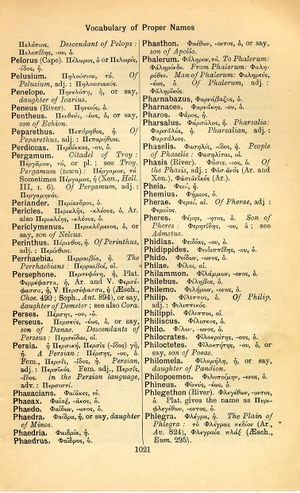Peneus
Τὸ γὰρ περισσὰ πράσσειν οὐκ ἔχει νοῦν οὐδένα → There is no sense in doing things beyond the usual measure
English > Greek (Woodhouse)
(River) Πηνειός, ὁ.
Latin > English (Lewis & Short)
Pēnēus: i, m., = Πηνειός,
I a principal river in Thessaly, which rises in Mount Pindus, flows through the Vale of Tempe, and falls into the Gulf of Therma, the modern Selembria; in mythology, a rivergod, the father of Cyrene and Daphne, Ov. M. 1, 569 sq.; Plin. 4, 8, 15, § 31; Liv. 32, 15; Verg. G. 4, 355; Hyg. Fab. 161; 203.— Voc. Penee, Ov. Am. 3, 6, 31.—Hence,
A Pēnēis, ĭdis, f., = Πηνηίς, of or belonging to the Peneus, Penean (poet.): Nympha, i.e. Daphne, Ov. M. 1, 504; 1, 472.—
B Pē-nēĭus, a, um, adj., = Πηνήϊος, of or belonging to the Peneus, Penean (poet.): Peneia Tempe, Verg. G. 4, 317: arva, Ov. M. 12, 209: Daphne, id. ib. 1, 452: amnis, i. e. the Peneus, Luc. 8, 33.—
C Pēnēus, a, um, adj., Penean (poet.): undae, Ov. M. 7, 230.
Latin > French (Gaffiot 2016)
Pēnēus¹⁴ ou Pēnēŏs, ī, m. (Πηνειός), le Pénée [fleuve de Thessalie] : Liv. 32, 15, 8 ; Virg. G. 4, 355

